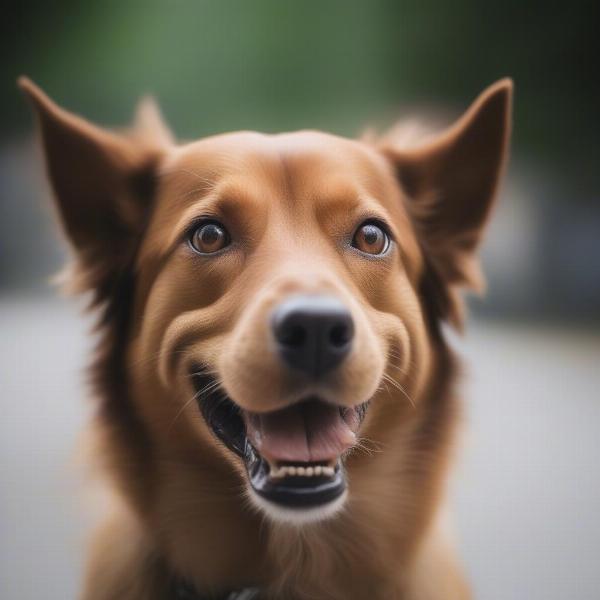Reactive dogs can be a challenge, but with the right training, they can learn to manage their responses and live happier, more relaxed lives. Finding qualified dog trainers for reactive dogs, however, requires careful research and consideration. This article will guide you through the process of identifying, evaluating, and selecting the perfect trainer for your reactive companion.
Understanding Reactive Dog Behavior
 Reactive Dog Showing Aggression
Reactive Dog Showing Aggression
Before searching for dog trainers for reactive dogs, it’s crucial to understand what constitutes reactive behavior. Reactivity isn’t necessarily aggression. It’s an over-the-top response to certain triggers, often rooted in fear, anxiety, or frustration. These triggers can range from other dogs and strangers to loud noises and unfamiliar environments. A reactive dog might bark excessively, lunge, growl, or even snap.
What to Look for in Dog Trainers for Reactive Dogs
Choosing a trainer for a reactive dog is a significant decision. Look for trainers who prioritize positive reinforcement methods, focusing on rewarding desired behaviors rather than punishing unwanted ones. Punishment can exacerbate reactivity, making the problem worse.
Experience with reactive dogs is essential. A trainer specializing in reactivity will understand the nuances of this behavior and tailor a training plan to your dog’s specific needs. Certifications and memberships in professional organizations, while not mandatory, can indicate a commitment to continuing education and ethical practices.
Questions to Ask Potential Dog Trainers
Don’t hesitate to interview potential dog trainers. Ask about their training philosophy, experience with reactive dogs, and approach to behavior modification. Inquire about their preferred training methods and whether they utilize force-free techniques. A good trainer will be happy to answer your questions and provide references.
What training methods do you use for reactive dogs?
A qualified trainer should explain their methods clearly, emphasizing positive reinforcement and avoiding aversive techniques.
Do you have experience working with dogs exhibiting similar reactivity to my dog?
Specific experience with similar cases demonstrates the trainer’s ability to handle your dog’s unique challenges.
Can you provide references from previous clients?
References allow you to hear firsthand experiences from other dog owners who have worked with the trainer.
Different Training Options for Reactive Dogs
Various training options exist, including private lessons, group classes, and board-and-train programs. Private lessons offer individualized attention, while group classes can provide socialization opportunities in a controlled environment. Board-and-train programs involve sending your dog to live with the trainer for an intensive period. board training dog The best option depends on your dog’s specific needs, your budget, and your lifestyle.
The Importance of Consistency and Patience
Regardless of the training method you choose, consistency and patience are crucial for success. Reactive dog training takes time and effort. Be prepared to work closely with your trainer and follow their guidance diligently. Celebrate small victories and remain positive throughout the process.
Conclusion
Finding the right dog trainers for reactive dogs requires research and due diligence. By understanding reactive behavior, asking the right questions, and prioritizing positive reinforcement methods, you can help your dog overcome their reactivity and live a happier, more balanced life. Remember, training is an ongoing process, and consistency is key to achieving long-term success. reactive dog training chicago
FAQ
- How long does it take to train a reactive dog? There’s no one-size-fits-all answer, as it depends on the severity of the reactivity and the dog’s individual temperament. It can take weeks, months, or even longer.
- Is medication ever used for reactive dogs? In some cases, medication can be helpful in conjunction with training. Consult your veterinarian to discuss if medication is appropriate for your dog.
- Can a reactive dog ever be fully cured? While “cured” might not be the right word, with consistent training and management, reactive dogs can learn to manage their responses and live fulfilling lives.
- What are some common triggers for reactive dogs? Common triggers include other dogs, strangers, loud noises, sudden movements, and unfamiliar environments.
- How can I manage my dog’s reactivity in public? Management techniques include avoiding known triggers, using positive reinforcement to redirect attention, and using a muzzle if necessary. shock collar barking dog
- Are group classes suitable for reactive dogs? Some group classes specifically designed for reactive dogs can be beneficial, but it depends on the individual dog and the class structure. dog training winston salem
- How do I find a qualified reactive dog trainer in my area? Ask your veterinarian for recommendations, search online directories, or contact local dog training organizations. reactive dog training nyc
ILM Dog is a leading international pet website dedicated to providing expert advice on dog care and training. We offer a wealth of information on various topics, including dog breeds, health, training, nutrition, grooming, and much more. Our team of experts is passionate about helping dog owners provide the best possible care for their canine companions. We also specialize in connecting dog owners with reputable trainers, like those specializing in reactive dog training. For more information about our services, please contact us via email at [email protected] or phone at +44 20-3965-8624. ILM Dog – your trusted source for all things dog.